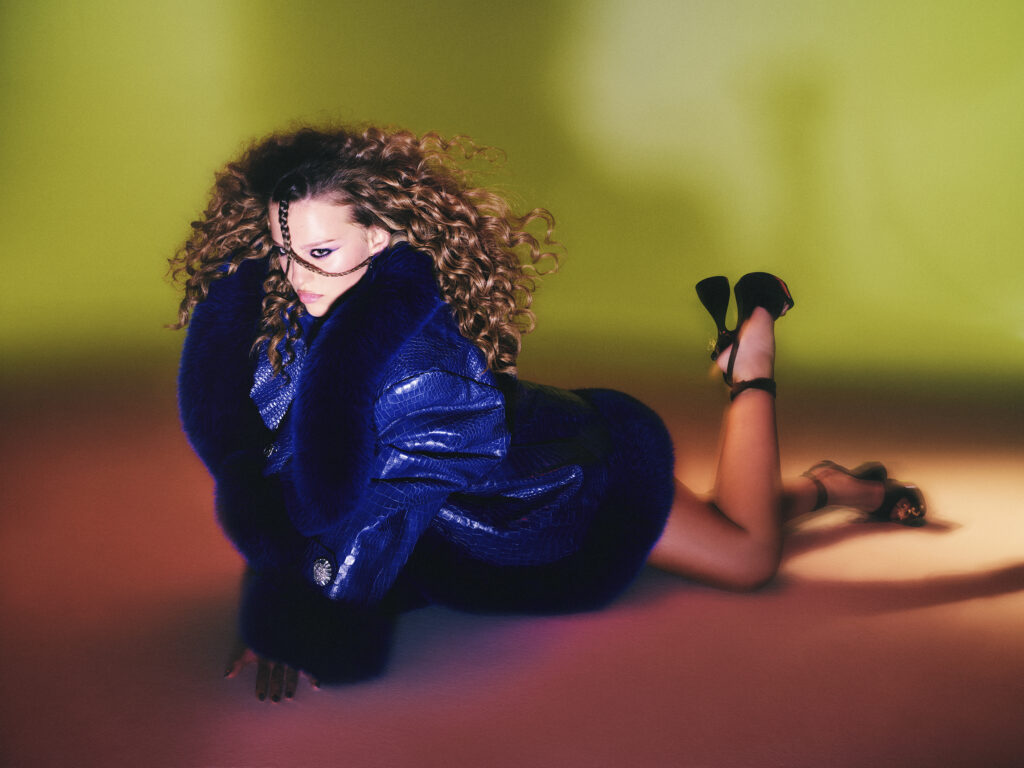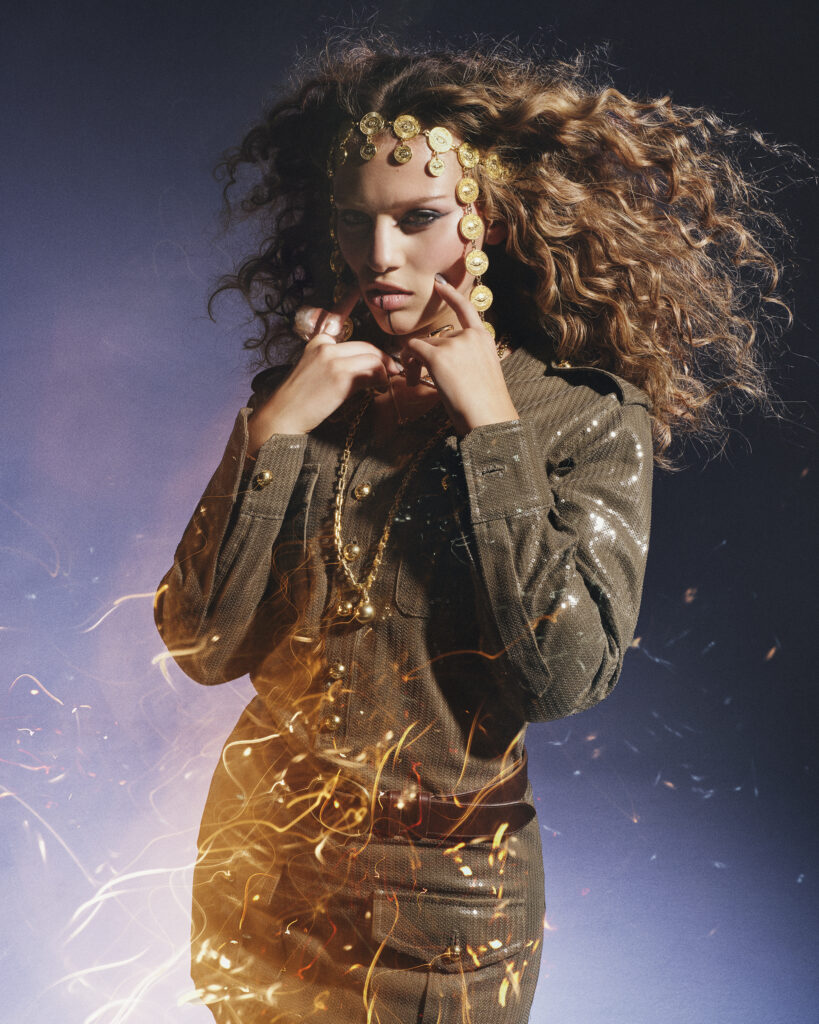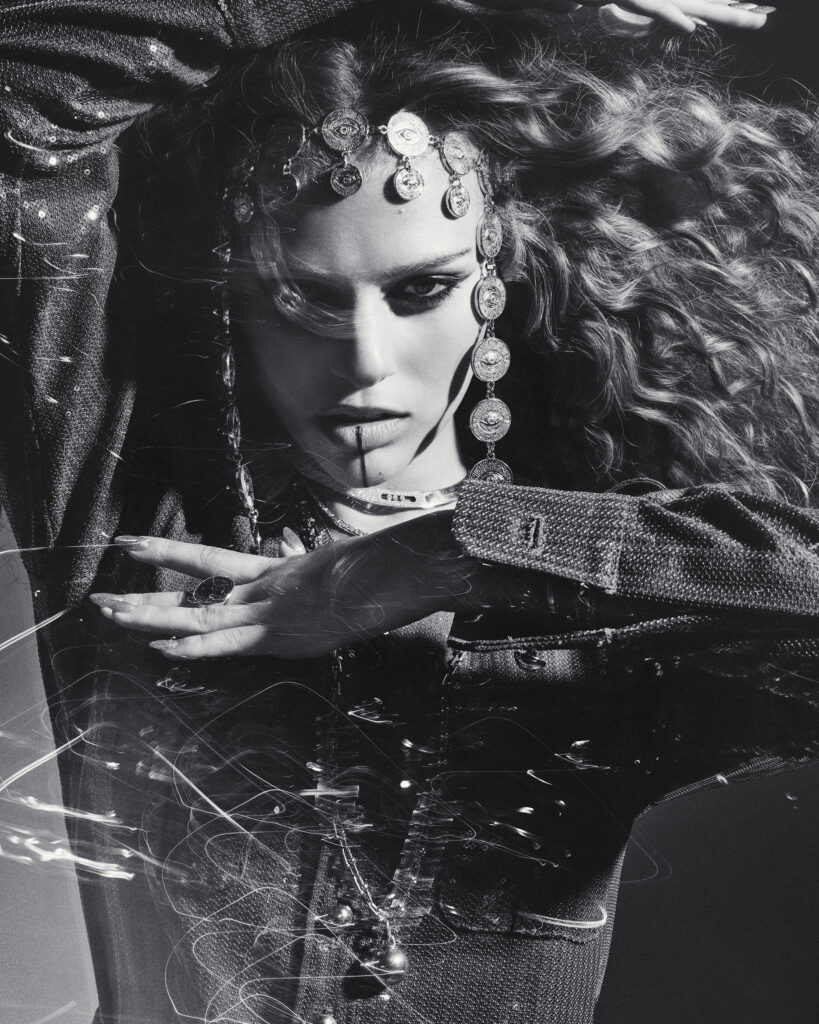If you told Elyanna the sky was the limit, she’d aim for another galaxy. The spirited 21-year-old singer-songwriter has made a habit of ignoring what’s realistic in favor of what’s possible—an attitude that’s launched her to unprecedented heights. Just this year, she was catapulted onto the world stage with a history-making performance at Coachella, where she became the first artist to perform a full set in Arabic. “I’m so grateful that I got an opportunity like that in my way, in my own sound,” she shares of the milestone moment. “I didn’t have to change anything in order to do my thing.”
Representing her roots as a Palestinian- Chilean artist has always been paramount for the Nazareth native, whose singular brand of pop is informed by Eastern and Western influences. Her parents introduced her to legends of the Arab music world like Fairuz and George Wassouf. Once she was old enough to curate her own playlists, however, Elyanna gravitated toward powerhouse vocalists, including Amy Winehouse, Beyoncé, Whitney Houston, and Etta James. Her musical sensibility was also shaped by her grandfather, a singer and writer. At weddings, he would perform zajal, a type of dueling performance poetry. “It’s like a freestyle. He’s spitting some bars,” she explains with a laugh.
Taking after her grandfather, singing came naturally to Elyanna. Her brother Feras encouraged her to upload covers to SoundCloud, where she quickly racked up hundreds of thousands of streams. At 15, her family immigrated to San Diego, leaving everything behind so she could chase her dreams. But the aspiring songstress wasn’t going to wait to be discovered. She DMed a video of her singing to Nasri, the frontman of Magic! and a fellow Palestinian. He responded with an invite to his studio. There, he made the suggestion that she sing in Arabic rather than in English. The fledgling artist worried it would limit her audience. Instead, it pushed her to express herself beyond the level of lyrics, steeping every inflection with feeling. “I want people to feel me when I sing in Arabic,” she says. “I know that it’s not something you understand, but I want you to feel my emotions and feel my attitude when I sing.”

Armed with silky-smooth vocals and unfettered determination, Elyanna is redefining the global music scene one hypnotic track at a time. In 2020, she released her debut EP, Ely- anna, featuring the shimmery breakthrough single “Ana Lahale.” Her follow-up EP Elyanna II, released last year, demonstrated a further maturation of her sound with experimental tracks like the reggae-infused “Ghareeb Alay.”
Next up: her highly-anticipated debut album, which is inspired by tribal fusion and M.I.A., among other influences. Lyrically, it promises to reveal a more personal side of the artist. “I feel like I found this different layer of Elyanna that I was looking for all the time,” she reflects. The positive reception to her Coachella performance has made her all the more excited to share her music with the world. “Arabic and our culture is so unique, so authentic, so beautiful. And it’s time for it to be out there,” she says. “It’s time for it to be international.”
For more on Elyanna’s musical upbringing, favorite artists, and future plans, read below.
V Magazine: Who were the artists that you were listening to growing up? The ones that really made you feel passionate about music or maybe the artists that your parents played around the house?
Elyanna: I always say that my family is such a huge fan of music, so they definitely inspired me by playing a lot of legends in the Arab world. I grew up listening to Fairuz and George Wassouf. It’s very heavy, beautiful music. Very deep. Another big inspiration for me is going to weddings in Palestine. It’s so fun. It’s so lit. The music, there’s the sad and there’s the happy—and when it’s happy, everybody’s dancing. And when it’s sad, people are so into it, and you see everybody singing. My grandpa, he’s a zajal and he’s an amazing singer and writer. Zajal is a freestyle. He’s spitting some bars. [Laughs.] It’s so interesting in a wedding. He would do that with another singer.
Other artists that I really looked up to were Lana Del Rey—she’s a huge inspiration—The Weeknd, Beyonce, Amy Winehouse, Whitney Houston, Aretha Franklin, Etta James, Dalida, and even artists like Amr Diab. I remember they paved the way for artists like me, really, because they were able to make their sound international in Arabic in their own style. So there’s a lot of inspirations, a lot of artists that really make me feel like, ‘Oh my God, I feel so inspired and I can’t wait to go to the studio or go to perform.’ They’re very impactful, and I always say I want to be able to have an impact as an artist.
V: You made history at Coachella as the first artist to perform a full set in Arabic. I’d love to know how that performance came to be and what that experience meant for you.
E: I would start by saying it was such a good experience. We did it. It happened and it was great. From every angle I feel like, you know, I’m recognized. When I went to Coachella, I had a purpose to achieve. My goal was to show my culture and sing my songs. I’m so grateful that I got an opportunity like that in my way, in my own sound. I did not have to change anything in order to do my thing. I was representing my art and my culture and my sound, and I was able to do it on one of the biggest stages in the world, which is such a big deal—not only for me, not only for my career, but for all Arabs, really, and anyone that dreams big. It was such an honor and it was such a good experience. There was a lot of amazing feedback. I had fun, my friends had fun, my family had fun, my team had fun, and everyone was just so grateful. It was a big moment for us. I can’t wait to see more, because I believe this is only one step and we’re just going to continue, hopefully, to grow.

V: Do you feel like there’s been a shift in terms of the receptiveness to non-English pop music since you were first starting out? Or, is there anything you’d still like to see change or improve in the music industry in that regard?
E: I always say that if I was doing this 10 years ago, maybe it wouldn’t really work because people were not that open to hearing new things. But now we’re in a different time where people are so into seeing something new. It was so nice to see different cultures watching my performance at Coachella. That’s really the whole purpose of this. Because I was singing in Arabic, we had Arabic instruments, we were just doing our thing. And I can see the crowd and the people that came to watch the show were from a lot of cultures. They’re not necessarily Arabs. They’re here because they want to see something new. That was such a confirmation for me. I’m like, ‘Okay, this is our whole purpose.’ To make sure that people that don’t listen to Arabic music will listen to it because it’s exciting, it’s interesting, and it’s different.
You can see that people are so much more open. They want to see something new, they want to see a different culture, and I’m here for it. Because I think that Arabic and our culture are so unique, so authentic, so beautiful, and it’s time for it to be out there. It’s time for it to be international.
V: Your second EP, Elyanna 2, came out a little over a year ago. With that project, how had you evolved since your debut, Elyanna, as a musician—and maybe even as a person? Did you take a different approach to that project?
E: 100 percent. When I started making music, I was 15, and I was just really experimenting with my sound and what I wanted to do. I would say the first EP was definitely an introduction to who I am. I was talking a lot about feeling so lonely as an immigrant, and talking about all these things as a young artist. But on the second one, I had a little more fun. I feel like it was very unique. It was different. It covered a lot of styles. For example, a song like “Ghareeb Alay” where you hear a reggae beat and Arabic lyrics, which is very—I’ve never heard that before, which I find so exciting. I feel like the second EP definitely was a lot of growth for me. Where I’m at right now is where I feel so powerful when it comes to my creative side and my music. I feel so inspired.

In this album that I’m working on right now, that is unreleased, I feel like I found this different layer of Elyanna that I was looking for all the time. And it’s here now. I am so excited for this album because I’ve never heard anything like it. It’s very experimental. It’s very out there. I got lots of my inspiration from Kanye West and M.I.A. and a lot of different artists that just really inspire me. Also tribal fusion, that’s something I’m so into right now.
V: What’s your biggest dream as a musician, as an artist?
E: I feel like when I started, I had the dream [to be] where I’m at now. Now I have an even bigger dream, and I feel like it’s just going to keep growing. It depends on where I’m at in my life and in my career. I would want something specific. But generally, my dream is to be able to represent my art and my music on a bigger scale, hopefully, and to be able to represent it internationally. I want to be able to sing in huge venues and I want to be able to tour all around the world. When I started making Arabic music, there were a lot of times where there were a lot of limitations and a lot of times you feel like people don’t expect you to get here or do this.
Even myself, I did not expect to do Coachella—and Coachella is such a big deal. Anything that feels like, because I sing in Arabic, I can’t approach it, I want to approach it. I want to get there. Anything that feels like it’s so far away, I want it. I do it with my heart and I do it because I love it. And I think that’s the drive and that’s the attitude that’s going to get me to the place that I’m looking for. Because I’m so, so passionate about my music and my art and my creativity, and I work every day to make sure that we’re representing it right and I’m putting out things that are with a purpose—things that feel right. I see [my music] going, hopefully, very big and I can’t wait to see where it’s going to go, really.

“Mama Eh” is out today. To stream, click the link below.
This feature appears in the pages of V143: now available for purchase!
Photography Dennis Leupold
Fashion Matthew Mazur
Makeup Lilly Keys (A-Frame)
Hair Clayton Hawkins (The Visionaries)
Production Vanessa Vossen (Art Department)
Digitial Technician Kevin Leupold
Editorial Direction & Casting Czar Van Gaal
Editor Kala Herh
Photo assistant Marco Bravo, Allison Lopez
Stylist assistant Nia Shambourger
Makeup assistant Elaina Karras
Hair assistants Sydney Staehle
Retouching Venus PP
Location Dust Studios
Discover More





